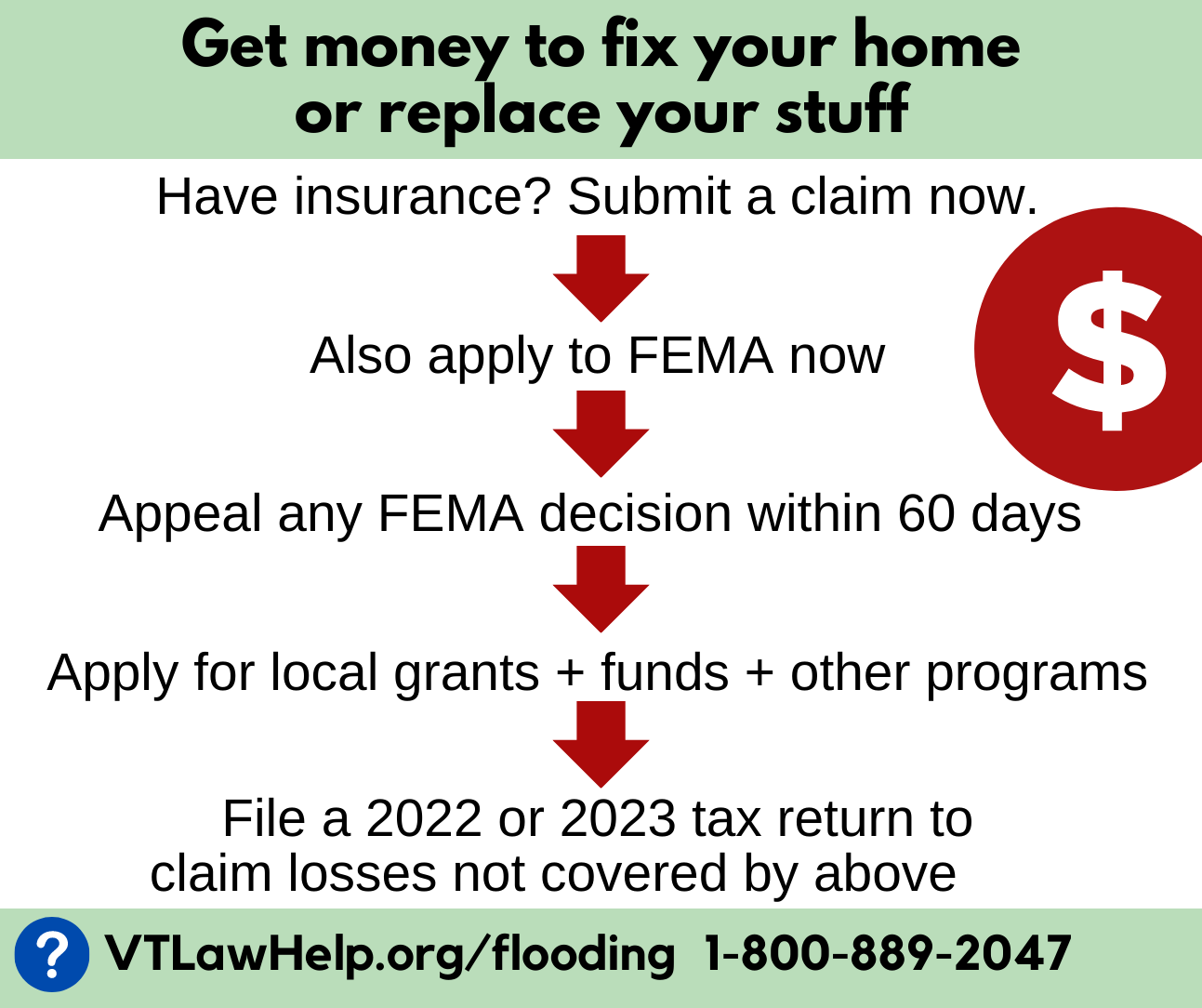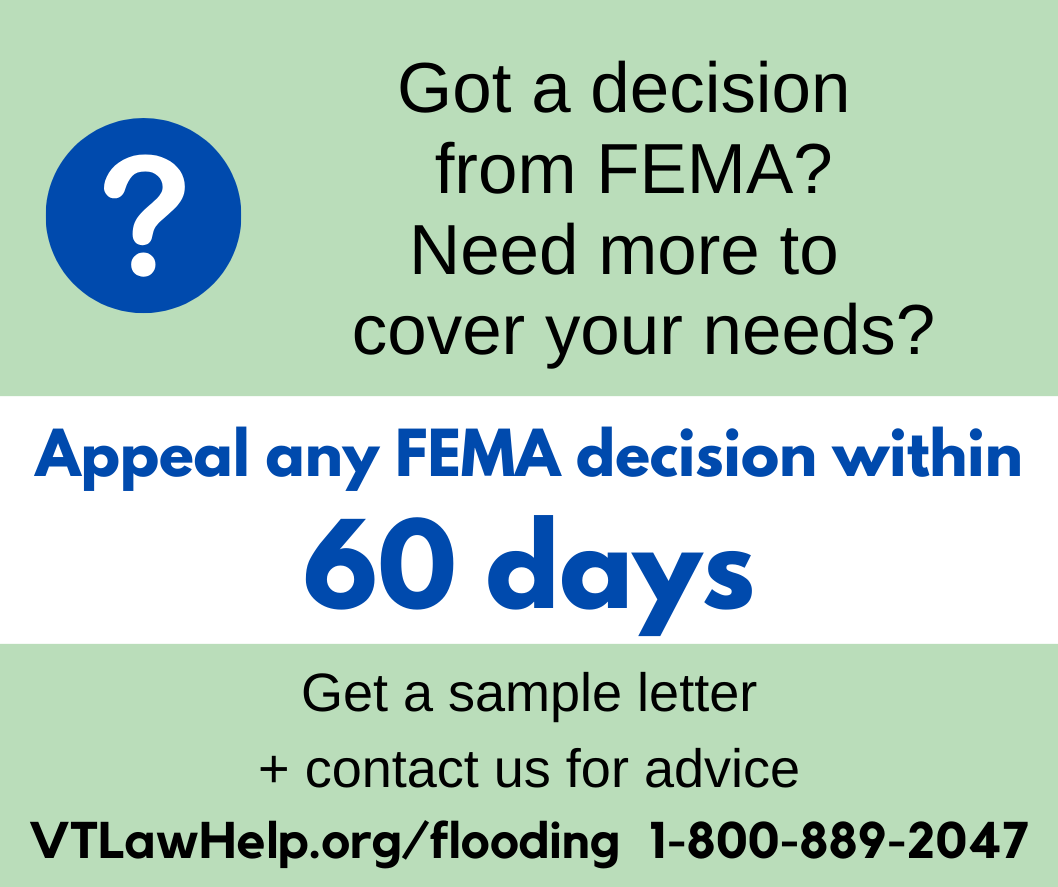Updated 7/11/2025
Flooding in July 2025
Heavy rains on July 10, 2025, caused flood damage in parts of Vermont.
In the Northeast Kingdom, Northeast Kingdom Organizing (NEKO) is on the ground providing help. You can report damage to your property or housing at this website: www.nekorganizing.org/flood (click on Get Help). Visit that site to get help or to offer help. You can also call NEKO at 802-321-3317.
Check below on this page for general information about responding to flooding and getting help.
Two severe flooding events in July 2024
Heavy rains caused flooding in parts of Vermont in July 2024. Two severe events were approved for federal disaster assistance for residents of certain counties in Vermont. Read about both events below.
Do you live in Caledonia, Essex or Orleans counties? Were you affected by both events? If so, be sure to file a FEMA application for each event.
The deadline for applying for help from FEMA was November 25, 2024. This deadline applies to both events.
Flooding/landslides/mudslides that took place on July 9 - 11, 2024
The following counties were approved for a major disaster declaration:
- Addison
- Caledonia
- Chittenden
- Essex
- Lamoille
- Orleans, and
- Washington counties.
FEMA’s disaster number for this event: DR-4810-VT
FEMA’s web page for this event: https://www.fema.gov/disaster/4810
Families and individuals from those counties who were impacted by the flooding, landslides and mudslides during those dates can apply to FEMA for financial help called "Individual Assistance."
You can apply for help from FEMA:
- Online at DisasterAssistance.gov. The FEMA website is accessible and includes language translation options.
- By phone at 1-800-621-3362. Press 1 for English, 2 for Spanish and 3 for all other languages. If you use video relay service (VRS), captioned telephone service or others, give FEMA your number for that service. Phones are answered from 7 a.m. to 10 p.m. seven days a week.
- Visit a FEMA Disaster Recovery Center, or
- Download FEMA’s Mobile App. Select Disaster Resources and click on Apply for Assistance Online.
Be prepared to appeal. These days, most people appeal decisions from FEMA to get a better award. FEMA often does not give people enough money when they approve applications, but then often gives more when you appeal. Learn how to appeal a FEMA decision on the FEMA website. Last year you had to submit a signed letter to appeal. But new for 2024, you don’t need a signed letter, but you can use a FEMA form and sign it. Be sure to include supporting documents and copies of receipts. Appeal any FEMA decision within 60 days of the date on the decision letter.
You can also apply for Disaster Unemployment Assistance if your work was impacted by the flooding and landslides.
See the information below on this page to find general information about filing insurance claims, FEMA applications and appeals, SBA disaster loans, USDA RD grants for homeowners, and more.
Flooding/landslides/mudslides that took place on July 29 - 31, 2024
The following counties were approved for a major disaster declaration:
- Caledonia
- Essex, and
- Orleans.
FEMA’s disaster number for this event: DR-4826-VT
FEMA’s web page for this event: https://www.fema.gov/disaster/4826
Families and individuals from those counties who were impacted by the flooding, landslides and mudslides during those dates can apply to FEMA for financial help called "Individual Assistance."
You can apply for help from FEMA:
- Online at DisasterAssistance.gov. The FEMA website is accessible and includes language translation options.
- By phone at 1-800-621-3362. Press 1 for English, 2 for Spanish and 3 for all other languages. If you use video relay service (VRS), captioned telephone service or others, give FEMA your number for that service. Phones are answered from 7 a.m. to 10 p.m. seven days a week.
- Visit a FEMA Disaster Recovery Center, or
- Download FEMA’s Mobile App. Select Disaster Resources and click on Apply for Assistance Online.
Be prepared to appeal. These days, most people appeal decisions from FEMA to get a better award. FEMA often does not give people enough money when they approve applications, but then often gives more when you appeal. Learn how to appeal a FEMA decision on the FEMA website. Last year you had to submit a signed letter to appeal. But new for 2024, you don’t need a signed letter, but you can use a FEMA form and sign it. Be sure to include supporting documents and copies of receipts. Appeal any FEMA decision within 60 days of the date on the decision letter.
You can also apply for Disaster Unemployment Assistance if your work was impacted by the flooding and landslides.
See the information below on this page to find general information about filing insurance claims, FEMA applications and appeals, SBA disaster loans, USDA RD grants for homeowners, and more.
New rules for 2024
Here are some changes in FEMA assistance rules for 2024. These changes apply to the July 2024 disasters in Vermont.
- FEMA’s Critical Needs Assistance program is now called Serious Needs Assistance and is available for this disaster. It provides up to $750 to cover immediate needs like shelter, evacuation, and basic household needs.
- FEMA offers Displacement Assistance for people who cannot return to their home. This provides up-front funds to assist with immediate housing needs.
- Survivors no longer need to apply for an SBA loan to be eligible for certain types of FEMA assistance.
- FEMA will now cover home repairs for pre-existing conditions to disaster-damaged homes. For example, if the roof leaked before the storm but the storm did a bunch more damage to the roof and/or other parts of the house, FEMA will cover the repairs that were needed before the disaster to get the house safe and sanitary.
- FEMA can cover improvements in accessibility that were not in place before the disaster for survivors with disabilities.
- Documentation is no longer necessary to support an explanation for a late application.
- Appeals no longer require a signed, written appeal letter accompanying the supporting documentation.
More information about these changes and others can be found on the FEMA website.
General information
Take photos of flood damage to your home and property. Keep copies of any receipts for expenses you have due to the flooding. You will need these if you file an insurance claim to your insurance company. If FEMA help becomes available, you will need photos and receipts, too.
Need help cleaning out your home? Your community may have volunteers who will help, or call the Crisis Cleanup hotline to ask for help: 802-242-2054.
Visit a State Flood Recovery Center. They provide state-level assistance to you if you were affected by flooding.
Here’s some general legal and benefits information for after a disaster:
- Vermont renter / tenant FAQs after a disaster
- Mobile home owners / lot renters FAQs
- Filing an insurance claim after a disaster
- Mortgages and property taxes after a disaster
- Finding emergency housing. For people impacted by recent flooding — or any Vermonter who needs emergency housing — call 1-800-775-0506 to find out about the General Assistance Housing Program (Hotel or Motel) for Catastrophic Need. If your application is denied, you have the right to appeal that decision. If you are denied or terminated from emergency housing, fill out our form and we will call you back. Or call us for help at 1-800-889-2047. Be sure to give us some details about your problem.
- Accessing public benefits. These include food stamps (3SquaresVT), welfare (ReachUp), social security disability, Medicaid, etc. If your 3SquaresVT food was ruined by flooding, report it within 10 days to get replacement benefits.
- Help for people with disabilities to get accessible housing, durable medical equipment (like wheelchairs), prescriptions, medical care, including mental health services, and accessible transportation.
- Employment issues including applying for unemployment assistance.
- Replacing important documents destroyed in the natural disaster, such as deeds, identification, birth and marriage records, and the like.
On this page we list benefits, recovery programs and common legal problems that can come up after a flooding disaster in Vermont with links to information and help. Much of the information below is related to the July 2023 federally declared flooding disaster. But it should also be helpful for those impacted by flooding in 2024.
Flood-related pages on VTLawHelp.org

Flooded? Get money to fix your home or replace your stuff. If you have insurance, submit a claim. Also apply to FEMA. Appeal any FEMA decision within 60 days. Apply for local grants and relief funds and other programs. If you are filing a tax return, claim losses not covered by insurance, FEMA or grants.

Got a decision from FEMA that you don't understand or don't agree with? Got less money than you need? These days, most people appeal decisions from FEMA to get a better award. It’s almost expected. Appeal any FEMA decision within 60 days. Get a sample letter here.
These are reasons why you should appeal:
- You got some money from FEMA, but it’s not enough to cover your needs.
- FEMA denied your request for help.
- FEMA said you were only eligible for a loan from SBA.
- You got some money from FEMA, but now you have new information that shows you need more help.
Important flood information and flood assistance in Vermont
Mental health
- Call Vermont SOS (Starting Over Strong) at 802-651-1767.
Food
Housing that flooded
General disaster help
Ongoing help from LTRGs and DCMs
Are you connected with your area’s Long-Term Recovery Group (LTRG)? If you were affected by the July 2023 floods, you may be able to get help and information from your local LTRG. Learn more about LTRGs.
Disaster Case Managers (DCM) help people plan for and achieve goals for recovery after a disaster. Read how DCMs may be able to help you.
Financial help for those affected by the July 2023 flooding
TIP: Moved due to the flooding? Keep FEMA and other organizations up to date with your mailing address.
Legal help

Translated information
These materials are in English and other languages.
American Sign Language
Videos in ASL include:
To top